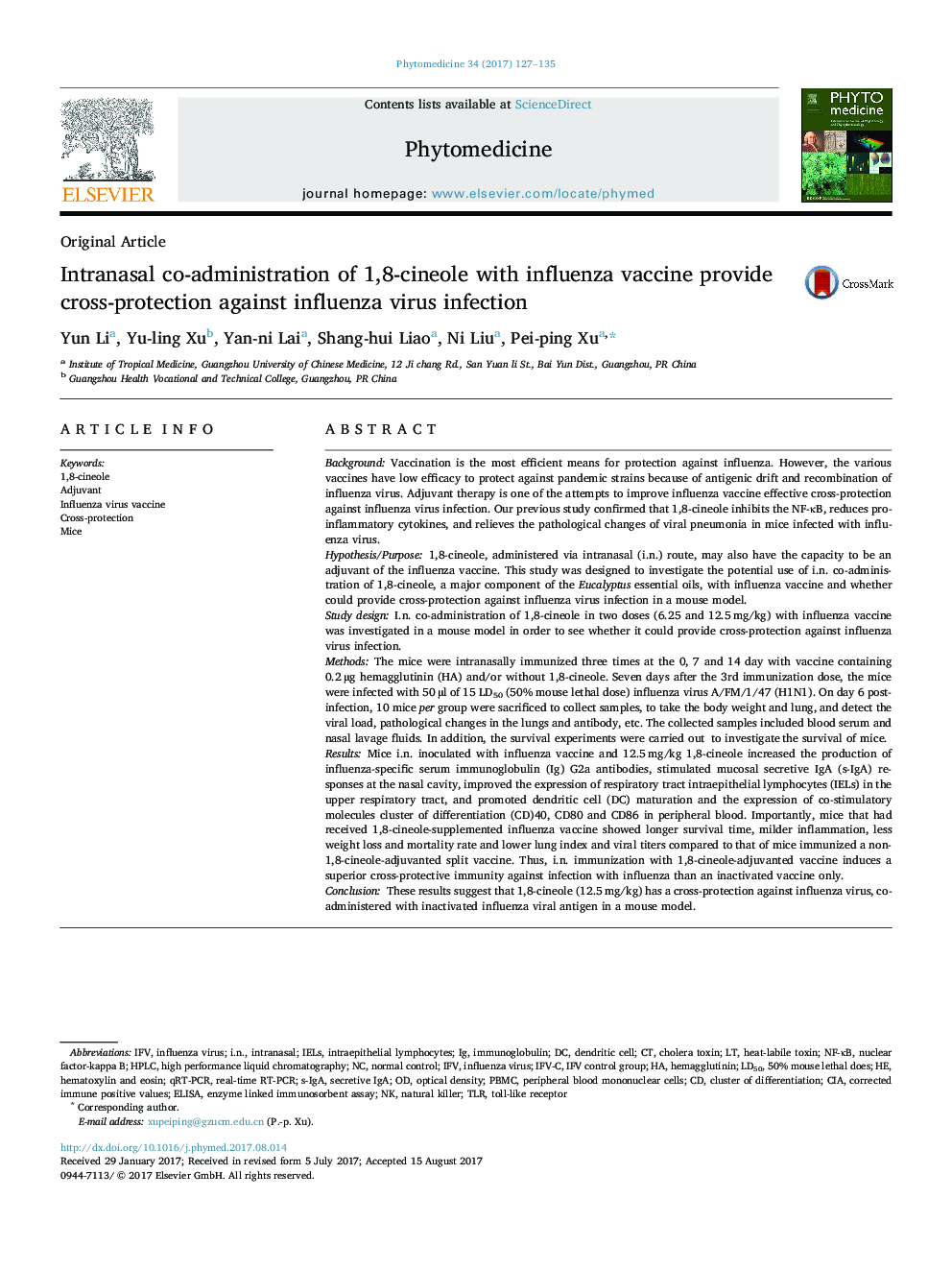| کد مقاله | کد نشریه | سال انتشار | مقاله انگلیسی | نسخه تمام متن |
|---|---|---|---|---|
| 5549315 | 1556685 | 2017 | 9 صفحه PDF | دانلود رایگان |

BackgroundVaccination is the most efficient means for protection against influenza. However, the various vaccines have low efficacy to protect against pandemic strains because of antigenic drift and recombination of influenza virus. Adjuvant therapy is one of the attempts to improve influenza vaccine effective cross-protection against influenza virus infection. Our previous study confirmed that 1,8-cineole inhibits the NF-κB, reduces pro-inflammatory cytokines, and relieves the pathological changes of viral pneumonia in mice infected with influenza virus.Hypothesis/Purpose1,8-cineole, administered via intranasal (i.n.) route, may also have the capacity to be an adjuvant of the influenza vaccine. This study was designed to investigate the potential use of i.n. co-administration of 1,8-cineole, a major component of the Eucalyptus essential oils, with influenza vaccine and whether could provide cross-protection against influenza virus infection in a mouse model.Study designI.n. co-administration of 1,8-cineole in two doses (6.25 and 12.5â¯mg/kg) with influenza vaccine was investigated in a mouse model in order to see whether it could provide cross-protection against influenza virus infection.MethodsThe mice were intranasally immunized three times at the 0, 7 and 14 day with vaccine containing 0.2â¯Âµg hemagglutinin (HA) and/or without 1,8-cineole. Seven days after the 3rd immunization dose, the mice were infected with 50â¯Âµl of 15 LD50 (50% mouse lethal dose) influenza virus A/FM/1/47 (H1N1). On day 6 post-infection, 10 mice per group were sacrificed to collect samples, to take the body weight and lung, and detect the viral load, pathological changes in the lungs and antibody, etc. The collected samples included blood serum and nasal lavage fluids. In addition, the survival experiments were carried out â¯to investigateâ¯the survival of mice.ResultsMice i.n. inoculated with influenza vaccine and 12.5â¯mg/kg 1,8-cineole increased the production of influenza-specific serum immunoglobulin (Ig) G2a antibodies, stimulated mucosal secretive IgA (s-IgA) responses at the nasal cavity, improved the expression of respiratory tract intraepithelial lymphocytes (IELs) in the upper respiratory tract, and promoted dendritic cell (DC) maturation and the expression of co-stimulatory molecules cluster of differentiation (CD)40, CD80 and CD86 in peripheral blood. Importantly, mice that had received 1,8-cineole-supplemented influenza vaccine showed longer survival time, milder inflammation, less weight loss and mortality rate and lower lung index and viral titers compared to that of mice immunized a non-1,8-cineole-adjuvanted split vaccine. Thus, i.n. immunization with 1,8-cineole-adjuvanted vaccine induces a superior cross-protective immunity against infection with influenza than an inactivated vaccine only.ConclusionThese results suggest that 1,8-cineole (12.5â¯mg/kg) has a cross-protection against influenza virus, co-administered with inactivated influenza viral antigen in a mouse model.
144
Journal: Phytomedicine - Volume 34, 15 October 2017, Pages 127-135